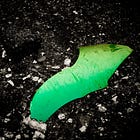clipper ships
I remember hearing once that when the Pilgrims landed at Plymouth Rock, the Wampanoag tribe reported not being able to see the English clipper ships until they were right in front of them, despite their size. The explanation is that since they had never seen anything like these behemoth floating cities, their brains literally could not make out the forms of the ships right in front of them. I realize that this is very much what the experience of losing a spouse is like. Like a clipper ship on the Atlantic coast approaching Wampanoag, I was not able to see what was right in front of me, until it overcame me. This book, and these poems, are my way of trying to see the unseeable. I hope that it can help others as they also try to see the unseeable in their own lives.
the crow
Two works that have resonated with me, and which I came upon six months-or-so into my grieving, are “Crow” by Ted Hughes and “Grief is the Thing With Feathers” by Max Porter, not necessarily in that order. They each use a character Crow to help tell the story of grief.
I can say for certain that Crow was with me.
He showed up immediately after she passed, just standing there in the ICU, even though it was three o’clock in the morning, and I had been alone just a few moments before. He didn’t flinch when my mother-in-law and brother-in-law came tearing into the room. He was just standing there, looking at me as I crumpled to the ground in complete recognition of the horror of the world I had just entered and the door that had just shut behind me that would never open again.
And there he was.
I wondered how long he was there, without me noticing. Smirking like a Cheshire cat. Cleaning gunk from under his fingernails. Kicking away a tiny paper cup that had been dropped instead of picking it up and throwing it away. Watching. Why?
When I got home, and for the months that followed, he was in every mirror, on every countertop, couch cushion, basement nook and cranny, tree bough and rocky path. Coffee shop, rest stop, traffic light, and corner bar. Every funeral chapel, church pew, synagogue carpeted sanctuary, parent-teacher-day school classroom, and sitting right behind my shoulder in the camera view of every work zoom call (I chose to keep the camera off, as often as possible – it was hard to concentrate with him making faces).
He was also interestingly sitting behind the bush where I first read her obituary. I thought I was getting away to hide from the world, which are the moments he seemed to relish most.
“You can’t get away from me pal.”
I remember the pine needles, the grass brown from too much sun. Too much sun, can you imagine? We can have too much of the strongest giver of life known. It giveth and it taketh away. He wasn’t smirking from the bush. He actually seemed surprised to see me, surprised that I would come to his domain for something.
“In nature we don’t cry kid. Go cry inside” he seemed to say. Of course when I went inside, he was there too, laughing at his own joke.
In the cemetery while I wondered if I was comforting my daughter appropriately (he told me I wasn’t). Right in front of others. He laughs while everyone else looks on with pity. It is so refreshing to be laughed at. Mock me. Show me my pain. You want to strangle it with bare hands. But it is also the only one that understands.
Oh, death is the most universal and the most individual thing in our known universe. We will all experience it, and yet it is so uniquely personal. I understand why soldiers cannot explain war – it is because of the laughing crow.




Wonderfully written. I have to figure out why the crow plays such role in death. I read the other book you referenced and again, well written, but the metaphor so far alludes me. I’m Such a scientist maybe.